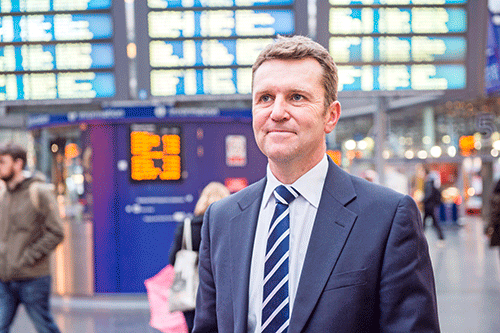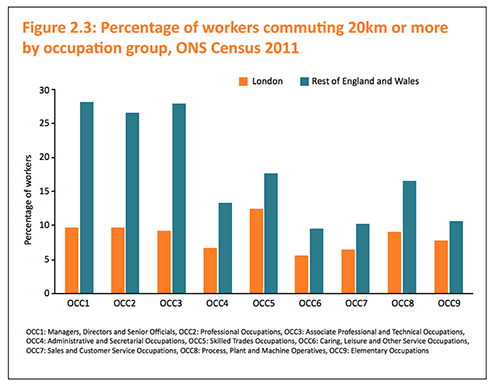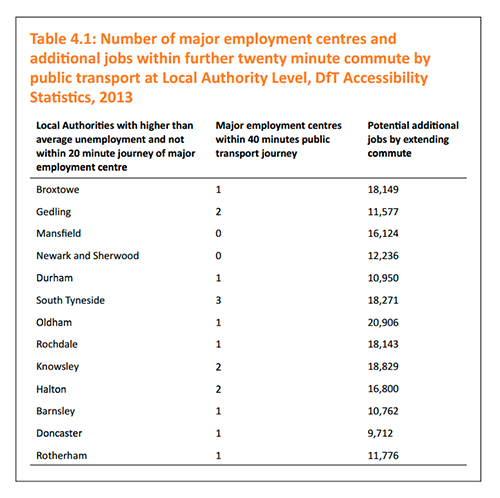 Read Alex Hynes' interview with Paul Clifton.
Read Alex Hynes' interview with Paul Clifton.
Read the peer reviews for this feature.
Download graphs for this feature.
An unemployed woman is late for an interview, and her benefits are slashed in consequence. A teenager is forced to turn down the offer of a college place because he can’t afford the rail fare. A pensioner struggles to make a late hospital appointment because the last bus home leaves at 1700. A developer has a planning application for social housing turned down because the public transport provision isn’t good enough.
These are the people who need to benefit from the devolution of transport powers. If Transport for the North cannot make their lives better, it will have failed.
There is grand talk of a road tunnel, or a rail tunnel, or even one that combines both, running under the Pennines between Manchester and Sheffield.
It may help the fit and healthy business travellers who can (frankly) afford the time wasted in traffic jams, or who can stand on crowded trains. But devolution is about reaching the people central government cannot reach, unleashing local solutions appropriate for local people.
Top-down, Westminster-led infrastructure is out. Regional-based people power is in. This is all about creating a healthier, more productive society in places that do not yet feel the warmth of London’s booming economy.
But hang on to that soft focus, sun-drenched image of public transport perfection. Because it’s a long way off yet.
Transport for the North is currently a team of 15 people, with a few more helping out in council offices around the region. They work for David Brown (chief executive) and John Cridland (very part-time chairman). They have vision and enthusiasm. But these are early days.
“We have a number of workstreams,” explains Brown at his borrowed office in the home of Transport for Greater Manchester. It sounds like his task is about as difficult as herding cats, each one determined on picking a different course.
“One is working with Network Rail, High Speed 2 and the Department for Transport on developing Northern Powerhouse Rail. That’s the potential new line from Liverpool to Hull and Newcastle, as well as influencing Control Period 5, the fallout from the Hendy Review, and any future schemes in CP6.
“The second is working with Highways England. They have three strategic studies looking at potential change to the trunk road network and a potential new tunnel between Greater Manchester and South Yorkshire.
“There are three other workstreams. One is pulling together a northern approach to freight. Another is local connectivity - schemes at a sub-regional level. And international connectivity - the places in the world to which we need better connections, and from which airports.”
Compared with the giant Transport for London, Brown’s budget barely registers on the graph. He has £10 million a year for the rest of this Parliament. Plus up to £150m to roll out smart ticketing and information, predominantly on rail. And potentially up to £120m in a Transport Development Fund for the tunnel plan.
The tunnel is the headline-grabbing grand gesture. The 40-mile road journey can take two hours on a bad day… the fastest train takes 48 minutes. There’s even a feasibility study into digging a trans-Pennine tunnel with road and rail side by side. But given that the national government already has HS2 as its flagship legacy to the north, how serious is this really?
“It is the first time this has been looked at comprehensively. There is no obvious way of moving between Manchester and South Yorkshire by road, without taking a very long time on roads that were never designed for the volume of traffic.
“They’ve identified five corridors. In the autumn there will be a preferred route, quantifiable costs and benefits. This is not being done lightly - this is a well-resourced piece of work.”
The Bill that established Transport for the North has been given Royal Assent. The organisation now officially exists. Next on the agenda: convince central Government what the organisation should look like, the role it should fulfil, and the powers it needs to achieve its objectives. In short: how much of its role the Department for Transport should surrender.
Brown has to be a master juggler - a diplomat as skilled as a Chinese ambassador to North Korea. Remember the showman spinning a hundred plates on tiny poles you watched on Blue Peter when you were a kid?
Somehow he has to pull along 49 competing local authorities of different political persuasions and with different concepts of localism, each with its own specific geographical issues. He has to present their united single vision to civil servants in London who must wave goodbye to their own power and influence, and he must persuade more civil servants at the Treasury to fund it. At the same time, he has to carry with him the private sector companies that operate the trains, the engineering giants that will build new rolling stock, and a Network Rail that is struggling to meet its own recently modified modernisation targets.
How can he achieve all of this?
“By being inclusive and transparent,” he replies. “Making sure all the local transport authorities are involved and understand the process. Making the case of why our transport plan is good for the North. If we get a stronger and more economically vibrant north, that is good for each of the regional parties.
“We have experienced no resistance from any of the transport authorities. There is a high level of aspiration and expectation.”
And what about those civil servants at the DfT, who are being asked to shrink their scope, authority and influence?
“The Department has to change because of us. We have regular meetings. They are involved in the decision-making. We will take responsibilities and powers that currently sit within the Department. And when that happens it will need the DfT to change both what it does and how it is financed.
“Bear in mind we are the first of what could be a number of sub-national transport bodies. So the Department will have to recognise that the change could happen across the country.”
It is likely that the Midlands will be next. The Government is devolving transport powers to English local authorities through the Cities and Local Government Devolution Bill and a forthcoming Buses Bill, which would give directly-elected mayors the responsibility to run local buses.
Brown notes: “To the north and west of us the powers are already devolved - the Welsh and Scottish Governments. And we are in discussion with Midlands Connect because they will be our southern boundary. So we would be at the centre of a significant devolution.
“Now we have to get the definitive voice of the North, and decide our requirements. We have to clearly articulate those requirements with strong supporting evidence to make the case to central government. This could involve us taking a greater commissioning role with people like Network Rail and Highways England.
“We envisage a greater role for Transport for the North in setting national objectives, through the HLOS and RIS processes. We will be involved from the start in setting the expectations of what Network Rail has to deliver. The role of ensuring that it brings forward the right solutions and takes any decisions that have an impact on local services and communications, that will rest with us and we will hold them to account.”
Brown is clear that TfN and TfL are very different organisations. He is not seeking to replicate what London has done.
“Geographically we are much bigger. The governance structure is much more rooted in local authorities. We have the potential for powers and responsibilities that do not sit with TfL. We can be designed from the bottom up - we have not evolved over time.”
There is a perception that TfN is an urban solution to metropolitan problems. A report by The Smith Institute in London suggested that the people who would have most to gain from focused regional investment in transport infrastructure would actually lose out - poor people in deprived or rural areas. Devolution has so far been concentrated on cities that the Government trusts to take on new powers.
Brown refutes this strongly. “The northern transport strategy has to cover the whole of the North. Economic growth here is not just urban. Look at the work on future energy being done in Cumbria through BNFL. Look at bioscience research - that is done in places like Daresbury in Cheshire. It is spread far and wide.”
The Government says the UK has a productivity problem. It is 17% below the average for G7 nations. Devolving transport powers is aimed at improving the mobility of the local workforce, to help reduce the productivity gap between London and other regions.
Jon Lamonte, chief executive of Transport for Greater Manchester, has been at the forefront of change - and not just because he’s giving David Brown some office space!
“The scale of opportunity facing Manchester doesn’t just concern this city and its 2.8 million residents,” Lamonte has said. “All the cities joining together have a population of 15 million. If we were a country we’d be the ninth biggest in Europe, with a collective GDP of £290 billion. If we can sort out some of the connectivity then we can add another £44bn to that.”
A report by The Policy Exchange think tank suggests that making it easier for people on low incomes to commute an extra 20 minutes each way would put them in touch with two or more additional employment sites and 10,000 more potential jobs.
And Chancellor George Osborne predicts that by 2020 the Northern Powerhouse will have generated 100,000 new jobs, raising the employment rate in the North West to the UK average.
And yet… the Campaign for Better Transport warns that much of the potential offered by Transport for the North is being wasted. TfN’s remit does not include buses. That will continue to rest with local transport authorities.
Despite two-thirds of all public transport journeys being made by bus, funding for local buses has reduced by 15% since 2010. More than 2,000 routes have been closed, and more cuts are expected. Further south, Wiltshire Council is consulting on plans to remove all council support for all bus services. It currently partially or wholly supports 50% of services.
“Buses is an issue best picked up at local authority level,” contends Brown. “I have quite enough on my plate. But over the next few years, if we are improving the point-to-point journeys between major centres, those places will also need stable and well-organised bus networks. A number of authorities are already looking at franchising.”
The Trades Union Congress has opposed devolution of rail powers, fearing that it may be used to cut national rail funding and break up National Rail. It believes greater accountability can best be achieved through a national integrated railway under public ownership. This is a view also advocated by Labour leader Jeremy Corbyn.
RMT General Secretary Mick Cash has claimed that 1,000 train guards will be made redundant once Rail North assumes control of the new Northern and Trans-Pennine franchises. “These are skilled quality rail jobs and their loss is hardly the right track to better services or a Northern Powerhouse,” he said.
“When I was leading Rail North we had two meetings with the RMT,” responds Brown. “We were clear that we wanted the best deal for passengers - more trains, better trains and new trains. That in itself will lead to more people with more skills - an increase in the number of people needed to move those extra trains around.
“We are also clear that the contracts with train operators include performance improvements. Customers expect things to get better. Arriva and FirstGroup will lead that - people want more capacity, improved customer service and better value for money.
“We had phenomenal growth in Northern with no investment. When we get refurbished and new trains, and service increases on Sundays and in the evenings, we are going to see an explosion in demand.”
For the two franchises based wholly or mostly in the region (Northern and Trans-Pennine), the new structure will simplify relationships. Instead of negotiating with myriad local councils, Rail North will set a common agenda. But what of the operators that merely pass through: Virgin’s West and East Coast, Midland Main Line, CrossCountry and all those freight trains?
“For Northern and Trans-Pennine it will be a massive step forward. Things will be much clearer. For the others we need to speak as a northern set of authorities and feed our priorities into the future franchise management. That currently is very fragmented - voices are sometimes not heard at all. We have the opportunity to put forward a single view.”
Brown spoke to RailReview in detail last year about his plans for smart ticketing (RailReview Q4-2015). How has this evolved?
Not much, it appears: “Our job is to put in something which improves personal mobility. It will bring the same attributes as London’s Oyster card but it will not be the same technology. It will share the ability to move between different modes and different places on a single card.
“The technology is changing at a rate of knots. My children have lots of personal accounts on their phones - music, banking, online shopping. They want a single personal mobility account.
“We will agree an implementation plan in the next couple of months. I come from a customer perspective - I am less concerned about the specific technology. Within the next couple of years we will have concepts to test across the North.
“We know the rail industry is looking at barcodes. The bus industry is committed to moving to contactless bank cards by 2022. We don’t want to duplicate that work. But we do not want to get dragged now into committing to which technology we will use.”
The DfT is bogged down in its favoured South East Flexible Ticketing programme. There is no suggestion that the two operations will share a common platform, just as SEFT and Transport for London’s pay as you go systems are incompatible.
Does the Department really understand how much it will have to change as regions go their own way? Will it move from a controlling leadership role to a mere co-ordinating and supporting one?
“Tricky question,” admits Brown diplomatically, anxious not to cause offence to his single most important relationship. “The legislation is there now. Over time the whole of England will create a network of sub-national transport bodies. The implication is that the Department for Transport will have to change. There is clearly a ministerial push to deliver this. And certain parts of the Department are keen.
“Central government has to change with us. These are formidable changes because the old system of control has been in place for a long time. It’s not about taking powers away from others, it’s about Transport for the North adding value. DfT will need to respond in kind.”
What’s in it for Brown? He came from two years in the top job at Merseytravel. Then he set up Rail North, which is now becoming the franchising arm of the wider Transport for the North.
But this isn’t a job where he can get his hands dirty. There are no operational issues to fix, no crises to fight, nor big teams of workers to lead. In fact, he has hardly any staff at all. So where’s the buzz for a man who clearly thrives on big challenges?
“I had a great time on Merseyside. But this is the first sub-national transport body. By the end of this Parliament, new responsibilities and powers will have been devolved to us. It really is a once in a lifetime opportunity.”
A typical day, he says, starts with a local rail commute into the office by 0730. This particular Monday morning started with a series of internal meetings about the week ahead. Then it was time to share experiences with Midlands Connect, followed by an hour with RailReview. The afternoon would be filled with checking on the various workstreams in progress, and finish with drafting a Memorandum of Understanding for working with the Scottish Government on cross-border issues.
So it’s a desk job in Manchester?
“Tomorrow I’m in Liverpool for a range of meetings about the Liverpool city region and then with freight operators and their customers. On Wednesday, John Cridland and I are in Leeds and then Newcastle.”
Cridland was Director General of the CBI until last year. Well-connected and influential, he is an ideal chairman for TfN. But his contract is for just 30 days a year - far less than one day a week. Can he be an effective leader with so little commitment?
“I have to say he has been brilliant. But we are using a lot of his time already, so we may have to negotiate for more days. He is very keen to represent the north in London with key decision-makers, but also to get out and about. We’ve used him a lot in discussions with central government and business.”
Brown is undoubtedly regarded as one of the bright sparks of the transport world. He has run South Yorkshire and Merseytravel. Now he gets to join them together. With equally well-regarded Alex Hynes staying on at Arriva’s new Northern franchise, it’s a strong pairing.
“I’ve worked in north of England transport for 26 years, both local government and private sector. This is a huge opportunity to bring together all that I have done and all the people I have worked with. It can put in place a clear, comprehensive, progressive transport system.
“In the next five years we will see in the North four or five times more investment in services, rolling stock and infrastructure than in the whole of the previous 25 years. It really is the opportunity of a lifetime.”
But what does that mean for Joe Bloggs, heading to the Job Centre for an interview? Someone who walks a bit, takes the bus a bit, hops on the train occasionally. When will he notice all this top-level empire building filtering down to street or platform level?
“Around 2017,” replies Brown with complete confidence. “Later this year we will have a plan. Between 2017 and 2019 people will see new trains, more services, new levels of customer service, WiFi on trains. By 2022 we will have electrified some of the North. And by then we will have a clear strategy for the next ten to 15 years to improve both the rail and the road networks. It is an evolving story. But this is not just about jam tomorrow.”
But surely a lot of that is driven by the organic growth of the regional economy. It is driven by working people slowly emerging from the years of recession, feeling more cash in their pockets and spending some of it on travel. The inextricable link between economic wealth and the distance and frequency of travel is well documented. Can Brown really claim that his predicted “explosion” in demand is down to a restructuring of the administration?
“Absolutely. All the franchising stuff is down to Rail North. The clarity, the focus, the bringing forward of new schemes will be about us in Transport for the North leveraging the best deals out of the national agencies.”
Separating the evidence of the specific differences made by the new organisation will not be easy. But there is no doubting the enthusiasm and commitment, and no doubting the goodwill coming from most of the transport and political groups that TfN will have to cajole. Maybe it will be more straightforward than herding cats… but not much.
- Read on for Alex Hynes' views on Transport for the North, in his interview with Paul Clifton
Read peer reviews for this feature.
Download graphs for this feature.
Transport for the North – The Operator’s View
If David Brown is now the most influential transport opinion-former in the North, ALEX HYNES comes a close second. The Northern Rail MD, who will stay on when Arriva takes over the franchise on April 1, shares his thoughts with PAUL CLIFTON
 Alex Hynes has helped shape the plans to transform the industry’s ‘Cinderella’ train operator. Could the railways have been upgraded in the North without a change in the administrative structure?
Alex Hynes has helped shape the plans to transform the industry’s ‘Cinderella’ train operator. Could the railways have been upgraded in the North without a change in the administrative structure?
“No. Everyone wants to take the credit for the new franchise. Department for Transport. The Treasury. Rail North. They all say that without them it would not be as good. But without Rail North’s intervention the franchise really would have looked different.”
What will Transport for the North achieve that the Department for Transport could not?
“Having both franchises managed for the North, by the North and from the North, in Leeds, has to be an improvement.
“At the moment you have the TransPennine Express franchise managed by the DfT from London. And you have the Northern franchise managed by the DfT from London, together with five Passenger Transport Executives.
“So if you’re not a PTE you have no formal say in the management of my business. And you don’t have any say in TransPennine whatsoever.
“The decision-making will be more local, which is the thrust of government policy and generally perceived to be ‘A Good Thing’. If you look at what has happened in London, Wales, Scotland and Liverpool, devolution has been good for rail.
“There is a coherence to it. You have all 29 local transport authorities having influence on both franchises now. Which is important, because the franchises are inter-dependent. It could have been one operation. But the sexy bit was skimmed off into a separate business.
“A lot of the railways in the North are two-track and not four-track. So what they do with their trains dictates what Northern does, and vice-versa.
“The 29 political leaders, having got hold of the baby, will want to spend even more. They’re going to work on the business case to make it even better. Which has to be good for customers.”
- Will Transport for the North get distracted by the ‘Big Idea’ of a tunnel between Manchester and Sheffield?
“No. David Brown will have to come up with short, medium and long-term packages that work for all 29 local transport authorities, not just a £10 billion headline scheme.
“Central government politicians will no doubt want their grand projet. A road or rail link under the Pennines could be necessary… at some point. It will take a long time and be very expensive. But we need some quick wins in there as well.
“I get on brilliantly with David Brown. He was at South Yorkshire, then Merseytravel, then he set up Rail North before getting the Transport for the North job. He understands what we need to do. That is a brilliant appointment. The combination of David with John Cridland as chairman is very powerful indeed.”
- The TUC opposes devolution of rail powers. It wants an integrated national railway under public ownership. The RMT union claims 1,000 train guards will lose their jobs once Rail North assumes control of the new franchises. How do you get these people on your side?
“After April 1 we will be sitting down with the RMT. Part of our franchise requirement is to move to driver-controlled operation. Whoever won the business would have to do a minimum of 50% of services controlled by the drivers.
“We need to modernise the railway. But this franchise is not about cuts. It is about growth. So despite the RMT press releases, the Northern headcount is going up. Northern is a growing, successful company. Yes, there will be change. No, we are not going to be sending large numbers of people out on the street.
“How do we bring them with us? We tell the story. We get them to trust us. Their agenda is about membership. They try to scare people that they will lose their jobs. The reality is the opposite.”
- After power is transferred to Transport for the North, how do you think the DfT will have to change?
“From April 1 the counterparty to the franchise agreement is the Secretary of State, not Rail North. So ultimately the Secretary of State still calls the shots. This is meant to be an intermediate arrangement. Next time we get a franchise, Rail North will be the counterparty and full devolution will take place.
“A devolved transport authority regards money spent on railways as an investment. Central government regards it as a cost. Central government departments don’t always see what their money does, and it’s easier for them to take a dim view of it.
“If you live in Leeds and you see that money bringing thousands of workers in every day to drive the northern economy, then you get a different outcome.”
- Will your new employer, Arriva, make much difference? The decision-making has all been done before it takes control.
“Clearly it will make a difference. But I have always argued that any of the big bus and train operators are more than capable of running a quality operation. The thing that will make the difference is the contract.
“The last contract was a no-growth, no-investment franchise. We’ve done a good job with the bum hand we were dealt. Arriva gets the next one, which is going to be amazing. Is that a function of Arriva winning? No. It’s a function of the specification, which the DfT wrote. The identity of the operator is a second-order consideration. Customers couldn’t care less.”
- In the past, new operators have almost always swept away the previous management. Why not this time?
“With days to go on the franchise, I can confirm what everyone else says. The franchise change is unsettling and upsetting for a while. We are all looking forward to the end of this strange time.
“From the outside looking in, it does appear that new companies make change for change’s sake. You get a hiatus while new directors are learning the business and forming a new team.
“Just because I’ve been appointed MD designate doesn’t mean that we will have exactly the same team and the same structure. I will be taking the best bits of Northern and making it even better with the billion pounds I’m going to get.”
- When will passengers start to see change that is attributable to the new administration - change that they weren’t going to see anyway?
“We have to be quick. Governments change. George Osborne founded the Northern Powerhouse - this is his baby. But he could be out of Number Eleven at any time - that’s what happens to politicians. His boss could fall and he could fall with him. He could be replaced by someone who is less passionate about it.
“So we need to get everything in place in months, not years. If you travel to work on a Pacer you struggle to comprehend that you’re in the sixth richest country. The North is fed up with having a railway that looks more like the developing world.
“By December 31 2019 every train will be new or refurbished. That sounds like a long way off, but it’s not. It is 44 months after the franchise starts. The quality of our railway in 2020 is going to beat the South. What we will do is going to put us top of the National Passenger Satisfaction surveys.
“Beyond that, what we want to do is travel across as fast as we travel down. Leeds to London is 190 miles - 2hrs 15mins. That is 1.4 miles every minute.
“If you apply that on Leeds to Manchester it should take 30 minutes. It doesn’t… it takes 55. That is the outcome we are looking for - a half-hour journey time. Then people would commute to work across the North as easily as people do into London.”
- That would take an extraordinary level of investment, well above anything you have been promised so far.
“Well, if London can get it, why can’t we? On pure bang for your buck, London and the South East will always get the money. But if you put a value on closing the gap between north and south, you can build a case for it. The South East economy is suffocating itself.
“It’s not like that here. Life is better. There is evidence that more people and more businesses are moving out of London. We are in a very exciting period. It’s us who are the driving force behind that change.”
Read peer reviews for this feature.
Download graphs for this feature.
 Peer review: Kate Morris
Peer review: Kate Morris
Director - Strategic Planning & Advisory, AECOM
Transport will be fundamental to turning our individual cities and towns in the North into a connected economy, and must remain the key focus of the Northern Powerhouse. But to achieve this connectivity between cities and to the rest of the world, much greater levels of funding will likely be needed than the public sector can afford.
Indeed, the scale of the projects currently being mooted is vast. In rail alone, options under consideration include substantial sections of entirely new line between Manchester and Sheffield and Manchester and Leeds, extending the HS2 network, significant upgrades and the electrification of existing lines. The next update of the Northern Transport Strategy, due in March as RailReview goes to press, will no doubt provide greater clarity around infrastructure priorities. Nevertheless, Transport for the North’s different workstreams indicate the ambition of the plans for enhancing connectivity.
Foreign direct investment will therefore be important to help fuel the Northern Powerhouse. But this will require local, regional, planning and transport authorities to create the right conditions to attract this inward investment. Investors will only want to back their best bet of getting a return, so certainty around planning issues and length of time for project delivery will be key. Developed Western economies are becoming increasingly attractive for Chinese investors, and the US already has a long history of investing in the UK. These potential sources of foreign investment must be further tapped by authorities in the North.
But creating an attractive investment environment requires transport infrastructure to be planned alongside housing, employment, schools and hospitals. A joined-up approach, with infrastructure built in line with these other vital enablers, will help ensure people want to live and work in an area. Real estate values will then increase, making infrastructure schemes more attractive to investors as a result. Given George Osborne’s prediction that the Northern Powerhouse could generate 100,000 new jobs by 2020, making it easier for people to live close to employment opportunities is a clear advantage of improved connectivity.
With multiple different planning and transport authorities operating in the region, joined-up thinking will require greater collaboration. The truly transformational change required to create a stronger, more balanced UK economy will not be possible without integration between neighbouring towns and cities. Authorities must work together as joint enablers to remove any barriers that can slow delivery, including uncertainty around planning issues. Not adequately dealing with these types of obstacles could discourage potential investors.
Clearly Transport for the North will have a vital role to play in bringing local transport authorities together. Strong leadership that encourages integration will help create certainty and attractive conditions for inward investment. Speaking to central government and potential foreign investors with one voice will help make the case for large-scale infrastructure.
Cities in the North are competing for investment like any other potential recipient project in every country. Securing foreign direct investment will therefore hinge on the region’s ability to create an attractive offering.
 Peer review: Richard Threlfall
Peer review: Richard Threlfall
UK Head of Infrastructure, Building and Construction, KPMG
It is just after 1600 on Friday, and I am on a TransPennine Express train from Piccadilly to Leeds. To clarify for London and overseas readers, that’s Manchester Piccadilly, although it did feel a bit like Piccadilly Circus on the platform and there was a scrum to get on board the three carriages. No WiFi. Lack of phone reception periodically, cutting me off from the rest of the world. I am just thankful I wasn’t an hour later leaving Manchester, standing for an hour in conditions so overcrowded they probably contravene European Union regulations on the transport of livestock.
It is the overcrowding on this route and many others across the North, and the time it takes to travel between the major cities, that is the raison d’etre for Transport for the North. David Brown gets that. But I am not entirely sure Paul Clifton does. “Grand talk of a road tunnel, or a rail tunnel” suggests a certain scepticism that these are realistic solutions, but transformational improvements in transport connectivity must be at the heart of the Northern Powerhouse.
Let’s take this back to fundamentals. It is all about productivity… or lack of. The productivity of the north of England is 11% lower than the average for the whole country, which in turn is 26% lower than the productivity of the US. Our country clings on by its fingertips to first world status, but will lose that within my lifetime unless we find ways to raise our productivity. And we do that by better connecting together population centres and jobs.
In countries across the world, the only way to unlock that productivity gain is through the expansion of cities into mega-cities with a population of more than ten million. But an expanding catchment area is increasingly expensive to connect, as London is finding. The North, however, is different - it already has a 15 million population concentrated around a large number of substantial (but by global standards irrelevant) cities. Put in place super high-speed transport links and we create a multi-centre mega-city, to take on the world and benefit the whole of the UK in the process.
Follow this logic, and devolution (and Transport for the North) is about the regional, NOT the local. David is right when he says buses are an issue best dealt with at a local authority level. What has been missing is regional-level planning, prioritisation and investment. That is what Transport for the North is there to fix. Its creation is a huge step forward and its success would be the blueprint for other regional authorities in England.
We had this same regional vs local debate in establishing Business North, an organisation that is there to offer views on issues affecting businesses across the region. Transport connectivity is top of the list. Businesses want to tap into a wider labour market, reach suppliers and customers more quickly, and have faster and more reliable freight corridors to national and international markets. None of that will happen by incremental improvements to existing routes where track was laid more than 100 years ago, winding romantically around the region’s beautiful geography. It will happen with new roads and rail routes in tunnels - expensive but transformative.



















Login to comment
Comments
No comments have been made yet.